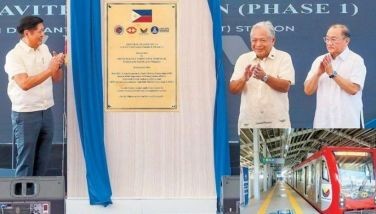RP, US line up more anti-terror, humanitarian projects
June 27, 2006 | 12:00am
More combined anti-terrorism training and a series of humanitarian projects are on the drawing board for the Philippines and United States military.
Armed Forces chief Gen. Generoso Senga said plans of more anti-terrorism training came up during the inaugural meeting of the Security Engagement Board (SEB) in Hawaii early this month.
"We have agreed to undertake further study as to what activities we can undertake together so we can address the problems confronting us, both the AFP and the US Pacific Command, particularly terrorism," he said.
Senga said coordination and meetings between the two allied countries would continue.
The Philippine and US military are lining up future joint military-civil action projects, along with humanitarian assistance projects similar to what was conducted in the past, he added.
The SEB has been tasked to coordinate efforts of the two long-time allies against non-traditional security threats like terrorism, trans-national crime, natural calamities and global disease outbreaks such as the avian flu.
It was created by virtue of a memorandum issued by President Arroyo last April 21 following an exchange of diplomatic notes.
Officials said the SEB would provide a mechanism for the implementation of the 1999 Visiting Forces Agreement (VFA), which provides for cooperation between the Philippines and the United States on extra-military affairs such as disaster response management.
Senga, as AFP chief, co-chairs the SEB with Adm. William Fallon, USPACOM commander.
The June 10 SEB meeting in Hawaii, attended by Senga, coincided with the regular meeting of the Mutual Defense Board (MDB), which addresses traditional security threats such as direct armed attacks on either country.
Aside from the US, the Philippines is also looking at other countries for much-needed defense and military cooperation.
Some of these countries are China, Australia and Brunei.
Meanwhile, security officials from the Philippines and Australia will meet today for the first bilateral consultations and assessment of counterterrorism engagements.
Philippine and Australian security officials will also discuss during the two-day bilateral consultations, which begin today, key areas of cooperation to thwart terrorist attacks and improve the security cooperation between the two countries.
Sources at the Department of Foreign Affairs (DFA) said the need of the Philippines to fight terrorism and set up bilateral security cooperation with Australia will also be discussed during the meeting.
A Filipino diplomat, who asked not to be named, said "the meeting in Manila is an offshoot of the Philippines-Australia joint ministerial meeting in Sydney in August last year."
Les Luc, Australia’s counterterrorism ambassador, will head the Australian delegation of 100 security experts, government officials and diplomats.
Heading the Philippine delegation is Foreign Affairs Undersecretary for Policy Erlinda Basilio.
The delegation will be composed of officials and representatives from the Department of National Defense, DFA, Philippine National Police (PNP), Department of Justice, Department of Transportation and Communications, Anti-Terrorism Task Force, Office of the Solicitor General, Office of Presidential Adviser on the Peace Process, National Economic and Development Authority, Department of Education, and Anti-Money Laundering Council. — Jaime Laude, Pia Lee-Brago
Armed Forces chief Gen. Generoso Senga said plans of more anti-terrorism training came up during the inaugural meeting of the Security Engagement Board (SEB) in Hawaii early this month.
"We have agreed to undertake further study as to what activities we can undertake together so we can address the problems confronting us, both the AFP and the US Pacific Command, particularly terrorism," he said.
Senga said coordination and meetings between the two allied countries would continue.
The Philippine and US military are lining up future joint military-civil action projects, along with humanitarian assistance projects similar to what was conducted in the past, he added.
The SEB has been tasked to coordinate efforts of the two long-time allies against non-traditional security threats like terrorism, trans-national crime, natural calamities and global disease outbreaks such as the avian flu.
It was created by virtue of a memorandum issued by President Arroyo last April 21 following an exchange of diplomatic notes.
Officials said the SEB would provide a mechanism for the implementation of the 1999 Visiting Forces Agreement (VFA), which provides for cooperation between the Philippines and the United States on extra-military affairs such as disaster response management.
Senga, as AFP chief, co-chairs the SEB with Adm. William Fallon, USPACOM commander.
The June 10 SEB meeting in Hawaii, attended by Senga, coincided with the regular meeting of the Mutual Defense Board (MDB), which addresses traditional security threats such as direct armed attacks on either country.
Aside from the US, the Philippines is also looking at other countries for much-needed defense and military cooperation.
Some of these countries are China, Australia and Brunei.
Meanwhile, security officials from the Philippines and Australia will meet today for the first bilateral consultations and assessment of counterterrorism engagements.
Philippine and Australian security officials will also discuss during the two-day bilateral consultations, which begin today, key areas of cooperation to thwart terrorist attacks and improve the security cooperation between the two countries.
Sources at the Department of Foreign Affairs (DFA) said the need of the Philippines to fight terrorism and set up bilateral security cooperation with Australia will also be discussed during the meeting.
A Filipino diplomat, who asked not to be named, said "the meeting in Manila is an offshoot of the Philippines-Australia joint ministerial meeting in Sydney in August last year."
Les Luc, Australia’s counterterrorism ambassador, will head the Australian delegation of 100 security experts, government officials and diplomats.
Heading the Philippine delegation is Foreign Affairs Undersecretary for Policy Erlinda Basilio.
The delegation will be composed of officials and representatives from the Department of National Defense, DFA, Philippine National Police (PNP), Department of Justice, Department of Transportation and Communications, Anti-Terrorism Task Force, Office of the Solicitor General, Office of Presidential Adviser on the Peace Process, National Economic and Development Authority, Department of Education, and Anti-Money Laundering Council. — Jaime Laude, Pia Lee-Brago
BrandSpace Articles
<
>
- Latest
- Trending
Trending
Latest
Trending
Latest
Recommended




























